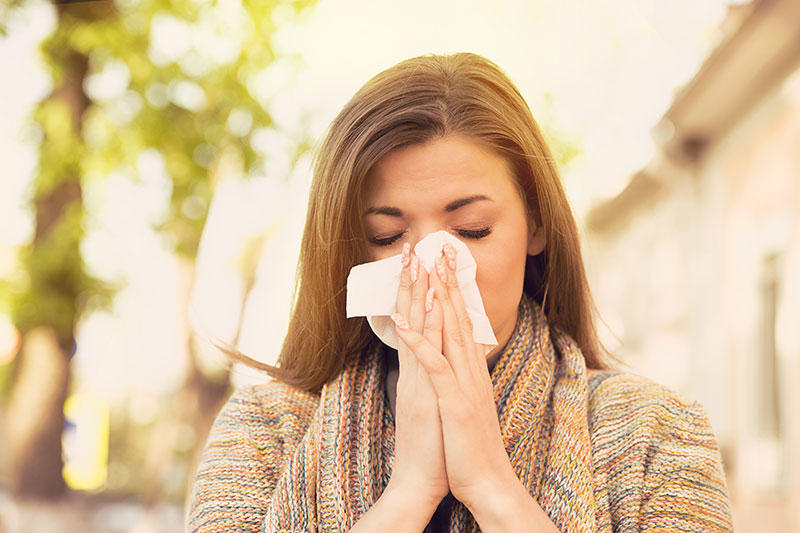Allergies are the 6th most chronic condition in the U.S. with approximately 50 million Americans suffering from allergies each year. The annual cost of allergies to the health care system and business in the U.S. is $18 billion. Symptoms range from making you miserable to putting you at risk for life-threatening reactions (anaphylaxis).
If you want to seek treatment for a possible allergy, you should see an allergist/immunologist for diagnosis and treatment to help you feel better and live better. Allergies are manageable. Don’t suffer from symptoms needlessly.
For more in-depth information about the different types of allergies, diagnosis, and treatment options available, check out our section on Conditions We Treat. If you are looking for quick information on the treatments we provide, check out our section on Allergy Treatments.
There are several different types of allergies that affect nasal and sinus passages, as well as the eyes, including:
Allergic rhinitis (or hay fever) refers to inflammation of the nasal passages. Symptoms often include sneezing, itching, congestion (stuffy nose), runny nose, and post-nasal drip. Many seasonal and indoor allergens, such as pollen, pet dander, mold or dust, can cause allergic rhinitis, among other things. Some patients have no identifiable allergies on testing and fall into the category of non-allergic or vasomotor rhinitis, which usually indicates a hyper-responsiveness of the nose due to a nerve imbalance.
Treatments for allergic rhinitis include avoidance techniques, medications, and immunotherapy (allergy shots or drops). Non-allergic rhinitis is treated with avoidance (if possible) and medications.
Allergic conjunctivitis (or eye allergies) often coincides with nasal allergies, but it can also occur on its own. Eye symptoms include itchiness, wateriness or redness. Treatment options include medications, such as eye drops and/or oral antihistamines, and immunotherapy.
Lung conditions affect your breathing, and for some people breathing trouble can be a sign that there is a problem with their lungs, keeping them from working as they should. If breathing problems come on suddenly or are severe, call 911.
There are several types of lung problems that can affect your breathing, including:
- Asthma
- Exercise-induced Bronchospasms
- Chronic Cough
Asthma is a long-term disease that makes your airways swollen, inflamed and narrow, so it is hard to move air in and out of your lungs. Symptoms often include a cough, wheezing, shortness of breath, and chest tightness. Diagnosis is based on history, exam, chest x-ray, a blood test, and special lung tests (such as spirometry). Allergen exposure and certain illnesses may cause intermittent symptoms or exercise may induce symptoms (exercise-induced bronchospasms, EIB). Symptoms can also be persistent and require daily medications (e.g., albuterol inhaler) to prevent or control lung inflammation. For children, a chronic cough can be a sign of asthma and is known as “cough variant” asthma. Immunotherapy (allergy shots or drops) can help prevent the progression of allergies to asthma when utilized in children. Asthma-related coughs won’t respond to cough drops, suppressants or antibiotics. You need asthma medication.
Allergic asthma triggers may include:
- Dust Mites
- Mold
- Perfume
- Pet Dander
- Pollen
Your doctor will advise you to stay away from these triggers, but of course, it is not always possible. When that is the case, your doctor may prescribe
- Antihistamines
- Steroid nasal sprays
- Other nasal sprays
- Allergy shots
There are even other things you can do in your home, like using special filters in your vacuum cleaner.
Besides being a possible symptom of asthma, chronic cough can also be a sign of rhinitis, allergic or non-allergic. Reflux is another common cause of a chronic cough. Treatment of a chronic cough is based on a diagnosis, which usually requires evaluation and testing.
There are many other conditions that can cause allergic reactions, including
- Anaphylaxis
- Food Allergies
- Eosinophilic Esophagitis
- Latex Allergy
- Oral Allergy Syndrome or Pollen Food Allergy Syndrome
Anaphylaxis is a severe systemic reaction to a trigger that needs medical treatment right away. The most common causes are allergies to peanuts, insect bites, and seafood. If you have an anaphylaxis reaction to a trigger, you need an epinephrine (adrenaline) shot right away, and someone should call 911. If left untreated, it can be deadly. As a follow-up, doctors will do a thorough history and physical, and testing to determine allergen triggers, so patients can avoid such triggers in the future.
Patients who have confirmed drug and food allergies should wear a medical alert bracelet or pendant or carry a card with information about their allergy. They should also carry at least two doses of epinephrine with them at all times, as once you’ve had an anaphylaxis reaction before you are at a higher risk of having another one.
Allergens – Food Allergies (e.g., peanuts, shellfish, fish, milk, eggs, soy wheat); Drug Allergies (e.g., penicillin, aspirin, ibuprofen, muscle relaxants, and other non-steroidal anti-inflammatory drugs, anti-seizure medications); Insect Bites and Stings (e.g., bees, wasps, hornets, yellow jackets and fire ants); Latex; Pollen (e.g., tree, grass, ragweed); or a Combination of These Triggers
Symptoms – Throat Swelling, Shortness of Breath, Wheezing, Coughing, Nausea, Vomiting, Diarrhea, Cramping, Low Blood Pressure, Fainting, Swollen or Itchy Lips or Tongue; Skin manifestations, such as hives, swelling, and flushing are usually in conjunction with the other systems listed above
Treatments – Avoidance of Triggers; Epinephrine Injections or Emergency Room Care for More Severe Cases
A food allergy occurs when the immune system triggers an abnormal response to a food. A food intolerance has no immune system response. For example, being allergic to milk is different than not being able to digest it properly due to lactose intolerance. Below is a list of the most common food allergens, symptoms, and treatment options.
Food Allergens – Eggs, Casein, Fish, Milk, Nuts, Shellfish, Soy, Sulfites, Wheat, Nuts
Symptoms – Abdominal Pain, Diarrhea, Digestive Problems, Hives, Itching in Mouth, Swallowing, Swollen Airway, Swollen Lips, Trouble Breathing, and Vomiting
Treatments – Antihistamine Drugs and Bronchodilators for Minor Cases; Epinephrine Injections or Emergency Room Care for More Severe Cases
Eosinophilic esophagitis is a chronic immune system disease affecting the digestive system. Patients with this disease have a white blood cell that builds up in the lining of the tube that connects your mouth to your stomach (esophagus). This build-up, which is a reaction to foods, allergens or acid reflux, can inflame or injure the esophageal tissue, which can lead to difficulty swallowing (dysphagia) or cause food to get stuck when you swallow. Other symptoms include chest pain that is often centrally located and does not respond to antacids, persistent heartburn, upper abdominal pain, no response to gastroesophageal reflux disease medication, and backflow of undigested food (regurgitation).
Your allergist may order a blood test to confirm the diagnosis and to begin to look for the sources of your allergic reaction (allergens). If you have a higher than normal eosinophil count or total immunoglobulin E levels, this would suggest an allergy.
Some people are allergic to latex, which is found in rubber gloves and other products, such as balloons, condoms, elastic bandages, envelope adhesive, rubber bands, and anesthesia face masks. Symptoms from latex exposure can vary from a contact rash to a full-body systemic reaction or anaphylaxis. If you have a severe reaction, call 911. Avoidance is key, even in those with just a rash as progression to anaphylaxis is unpredictable. Patients who have a confirmed latex allergy should wear a medical alert bracelet or pendant or carry a card with information about their allergy.
Allergen – Latex Products in Community and Hospital Settings
Symptoms – Red, Itchy Rash Where Your Skin Touched Latex; Swelling Around the Skin Where it Touched You; Sneezing, Runny Nose, or Teary Eyes
Symptoms for Severe Reactions – Trouble Breathing or Swallowing, Chest Pain, Drop in Blood Pressure, Wheezing, Tightness in Chest
Treatments – Avoidance; Oral Antihistamine (avoid antihistamine creams or gels, as they make your skin feel worse); Calamine Lotion or 1% Hydrocortisone Cream; Emergency Care for Severe Reactions
People who have these allergies usually have symptoms right after they eat or within an hour after eating. They take a bite of an apple or a banana, and they immediately experience itching, tingling and swelling to the mouth, lips, and throat. This happens because their immune systems cannot tell the difference between proteins in these foods and pollen due to a cross-reactivity of pollen with certain raw fruits and vegetables. Many people don’t even know they have these allergies. They usually find out when their allergy testing is negative for foods, but positive for pollen (e.g., birch, grass or ragweed). In most cases, symptoms don’t last long. It is also rare to have a severe or life-threatening reaction (anaphylaxis), but it can happen. Fortunately, some patients have found that if they heat the raw fruit or vegetable, denaturing the cross-reactive protein, it allows them to eat the food without incident.
Allergen – Allergic Antibody (IgE) to a Specific Food
Symptoms – Itching, Tingling, and Swelling to the Mouth, Lips, and Throat; Hives, Respiratory Distress, Cramping, Nausea, Vomiting, Diarrhea, Lightheadedness, Dizziness, Fainting
Treatments – Oral Antihistamines; Immunotherapy (e.g., allergy shots or drops); Epinephrine and Emergency Care for Severe Reactions; Avoidance of Triggers; Heating the Fruit or Vegetable
If you think you are suffering from an allergy, please contact CT Sinus Center at (203) 574-5997 for a full allergy workup. Our allergists treat adults as well as children, 6 years and older. Remember that children often present symptoms differently than adults. Their symptoms may include, ear infections, snoring, hives, swollen airways, irritability, and dietary problems. Please contact us to see how we may help you or your loved one.



